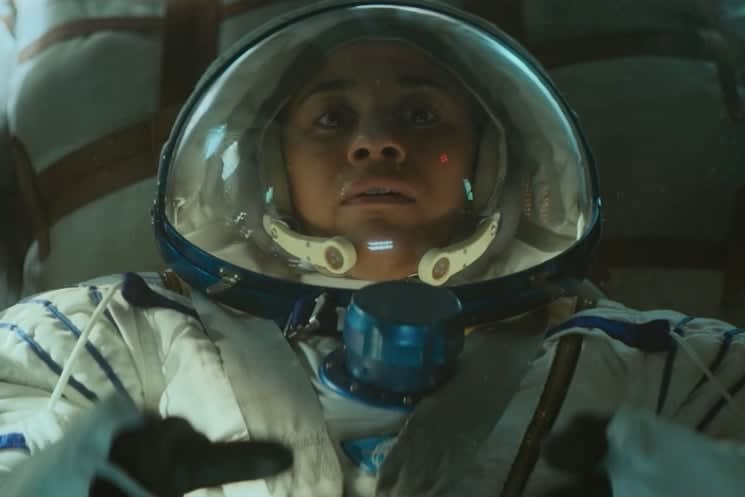After hearing the three customary Russian knocks establishing a warm welcome (or perhaps superstition), we're introduced to the International Space Station (I.S.S.) — a collaboration between the US and the then-USSR and the beginning of international cooperation for space exploration between the two nations following the Cold War. Logistically and philosophically, the I.S.S. forms the backdrop of Gabriela Cowperthwaite's latest film, the aptly-titled I.S.S.
Set in the present day, first-time astronaut Dr. Kira Foster (Ariana DeBose) and fellow American and returning astronaut Christian Campbell (John Gallagher Jr.) voyage to the I.S.S., where another American astronaut, Gordon Barrett (Chris Messina), greets his compatriots onboard the space station, alongside the Russian cosmonauts: Weronika Vetrov (Masha Mashkova), Alexey Pulov (Pilou Asbæk) and Nicholai Pulov (Costa Ronin).
In the opening moments of the film, Nick Shafir's script — an inclusion on the 2022 "Black List" of Hollywood's most promising scripts — efficiently orients the audience in regards to the group's dynamics (friendly and respectful) while laying breadcrumbs for us to mentally bookmark for later use: "The low hum you're hearing, that's our life support," for example.
Trouble aboard the I.S.S. begins after Kira observes what initially appear to be volcanic eruptions on Earth, and turn out to be calculated explosions as the U.S. and Russia wage war on one another. Houston sends a discreet message to Gordon commanding the Americans take the I.S.S. "by any means necessary," with the cosmonauts receiving similar instructions from their own government.
To illustrate the unrelenting tension, Cowperthwaite contrasts the inherently claustrophobic environment of the space station with a stunning image of a literal scorched Earth in the background, courtesy of director of photography Nick Remy Matthews and visual effects supervisor Chris LeDoux. Cowperthwaite often flips between the cold-palette close-ups in the I.S.S. and wide shots of the Earth's breadth to give audiences a sense of proximity and priority, and it also proves to be an effective tool in pacing the film, allowing viewers to breathe when necessary.
Those breadcrumbs laid in the first act do threaten, in the moment, to act as a spot-the-clue exercise, but thanks to stirring performances by the ensemble, it's not only easy to forgive such a trope, it almost creates a fun who's-gonna-do-it-first situation. Of the cast, Mashkova stands out in particular, offering up an emotional roller coaster that pierces the heart of the film.
I.S.S. succeeds by working within its premise. There are obvious takeaways and parallels to our world today (perhaps even more so today than when Shafir wrote the screenplay), but the film never looks to jam any specific world outlook or lesson down our throats. Instead, I.S.S. remains focused on the conflict on board, bringing us into the professional and personal relationships of the astronauts and cosmonauts and the difficult decisions faced by these incidental soldiers of war.
While I.S.S. isn't particularly refreshing or new, there's a curiosity as to why this film was shuttled off to the January release film graveyard. It's a well-made sci-fi action film with an intriguing premise, a committed cast and some excellent special effects; there's no reason why this wouldn't carry its weight in the spring or summer.
(Elevation Pictures)Set in the present day, first-time astronaut Dr. Kira Foster (Ariana DeBose) and fellow American and returning astronaut Christian Campbell (John Gallagher Jr.) voyage to the I.S.S., where another American astronaut, Gordon Barrett (Chris Messina), greets his compatriots onboard the space station, alongside the Russian cosmonauts: Weronika Vetrov (Masha Mashkova), Alexey Pulov (Pilou Asbæk) and Nicholai Pulov (Costa Ronin).
In the opening moments of the film, Nick Shafir's script — an inclusion on the 2022 "Black List" of Hollywood's most promising scripts — efficiently orients the audience in regards to the group's dynamics (friendly and respectful) while laying breadcrumbs for us to mentally bookmark for later use: "The low hum you're hearing, that's our life support," for example.
Trouble aboard the I.S.S. begins after Kira observes what initially appear to be volcanic eruptions on Earth, and turn out to be calculated explosions as the U.S. and Russia wage war on one another. Houston sends a discreet message to Gordon commanding the Americans take the I.S.S. "by any means necessary," with the cosmonauts receiving similar instructions from their own government.
To illustrate the unrelenting tension, Cowperthwaite contrasts the inherently claustrophobic environment of the space station with a stunning image of a literal scorched Earth in the background, courtesy of director of photography Nick Remy Matthews and visual effects supervisor Chris LeDoux. Cowperthwaite often flips between the cold-palette close-ups in the I.S.S. and wide shots of the Earth's breadth to give audiences a sense of proximity and priority, and it also proves to be an effective tool in pacing the film, allowing viewers to breathe when necessary.
Those breadcrumbs laid in the first act do threaten, in the moment, to act as a spot-the-clue exercise, but thanks to stirring performances by the ensemble, it's not only easy to forgive such a trope, it almost creates a fun who's-gonna-do-it-first situation. Of the cast, Mashkova stands out in particular, offering up an emotional roller coaster that pierces the heart of the film.
I.S.S. succeeds by working within its premise. There are obvious takeaways and parallels to our world today (perhaps even more so today than when Shafir wrote the screenplay), but the film never looks to jam any specific world outlook or lesson down our throats. Instead, I.S.S. remains focused on the conflict on board, bringing us into the professional and personal relationships of the astronauts and cosmonauts and the difficult decisions faced by these incidental soldiers of war.
While I.S.S. isn't particularly refreshing or new, there's a curiosity as to why this film was shuttled off to the January release film graveyard. It's a well-made sci-fi action film with an intriguing premise, a committed cast and some excellent special effects; there's no reason why this wouldn't carry its weight in the spring or summer.
